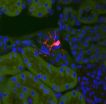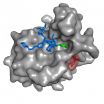(Press-News.org) Inflammatory skin diseases such as psoriasis may result from abnormal activation of cell death pathways previously believed to suppress inflammation, a surprise finding that could help to develop new ways of treating these diseases.
Mr James Rickard, Associate Professor John Silke and colleagues from the Walter and Eliza Hall Institute made the discovery while investigating how cell death pathways are linked to inflammatory disease development. The study was published today in the journal eLife.
Infected cells, cancerous cells, or those that are simply unnecessary to the body are instructed to die in a programmed process called apoptosis. Through this process, cells die without affecting or harming surrounding cells, and without mounting an immune response.
Mr Rickard said another recently discovered form of cell death, known as necroptosis, also instructed cells to die by a 'programmed' series of events, with a key difference. "Necroptosis occurs when something has gone wrong with the normal process of apoptosis," Mr Rickard said. "The necroptotic pathway signals that something sinister might be happening, alerting and recruiting key immune cells to the 'scene of the crime'."
Both types of cell death have been implicated in the development of immune disorders, Mr Rickard said. "Previous research has linked necroptosis - or inflammatory cell death - with inflammatory diseases such as psoriasis and, particularly, Crohn's disease."
In the study, the research team looked at how the loss of key molecules involved in either necroptosis or apoptosis affected inflammation and inflammatory disease development.
"We were surprised to discover that apoptosis was the culprit in the development of inflammatory skin disease, while more extensive, system-wide inflammation such as in the liver and spleen was driven by necroptosis," Mr Rickard said. "This was quite unexpected, because apoptosis is not normally associated with inflammation."
A good understanding of necroptosis could help to develop better strategies for treating inflammatory diseases in the future, Associate Professor Silke said.
"This work has also provided us with clues about how existing medications for inflammatory diseases such as psoriasis work, suggesting their effectiveness could be related to their inhibition of apoptosis and necroptosis cell death pathways," he said.
"These existing medications are very effective, however there are significant side-effects. Additionally, these medications do not work for everyone, and can lose their effectiveness over time. By further interrogating these cell death pathways and their role in inflammatory diseases, we may identify new therapeutic targets that provide relief for patients, with drastically reduced side-effects."
Associate Professor Silke said there was still much to discover about necroptosis. "We are only just beginning to understand the complex cascade of signals involved in necroptosis," he said. "It is clear though that necroptosis is very important in our response to infection and disease."
"Scientists from the Walter and Eliza Hall Institute have had great success in unravelling the many complex signals in apoptosis and developing potential treatments based on these findings. A number of teams at the institute, including mine, are now turning their attention to this new cell death pathway, to better understand how it functions in normal and diseased cells. We hope to have the same success and see new treatments based on these fundamental scientific findings in the future," he said.
INFORMATION:
The study was funded by the Australian National Health and Medical Research Council, Australian Cancer Research Foundation, Thomas William and Violet Coles Trust Fund and the Victorian Government.
Vitamin D deficiency is not just harmful to physical health--it also might impact mental health, according to a team of researchers that has found a link between seasonal affective disorder, or SAD, and a lack of sunlight.
"Rather than being one of many factors, vitamin D could have a regulative role in the development of SAD," said Alan Stewart of the University of Georgia College of Education.
An international research partnership between UGA, the University of Pittsburgh and the Queensland University of Technology in Australia reported the finding in the November ...
URBANA, Ill. - A 12-year University of Illinois study shows that, although the use of cover crops does not improve crop yields, the practice does increase the amount of sequestered soil organic carbon using three different soil management systems.
U of I soil scientist Ken Olson evaluated plots that were subjected to no-till, chisel plow and moldboard plow treatments with and without hairy vetch and cereal rye cover crops.
"By 2012, we found that the soil tillage plots that had cover-crop treatments had more soil organic carbon stock than those without cover crops ...
ROCHESTER, Minn. -- Most patients with triple-negative breast cancer should undergo genetic testing for mutations in known breast cancer predisposition genes, including BRCA1 and BRCA2, a Mayo Clinic-led study has found. The findings come from the largest analysis to date of genetic mutations in this aggressive form of breast cancer. The results of the research appear in the Journal of Clinical Oncology.
"Clinicians need to think hard about screening all their triple-negative patients for mutations because there is a lot of value in learning that information, both in ...
Researchers from Brigham and Women's Hospital (BWH) have identified what they believe to be the cells responsible for fibrosis, the buildup of scar tissue. Fibrotic diseases, such as chronic kidney disease and failure, lung disease, heart failure and cirrhosis of the liver, are estimated to be responsible for up to 45 percent of deaths in the developed world.
The findings are published online in the journal Cell Stem Cell.
"Previous research indicated that myofibroblasts are the cells responsible for fibrosis," said Benjamin Humphreys, MD, PhD, senior author of ...
New research from North Carolina State University and the University of Minnesota shows that the majority of consumers will accept the presence of nanotechnology or genetic modification (GM) technology in foods - but only if the technology enhances the nutrition or improves the safety of the food.
"In general, people are willing to pay more to avoid GM or nanotech in foods, and people were more averse to GM tech than to nanotech," says Dr. Jennifer Kuzma, senior author of a paper on the research and co-director of the Genetic Engineering in Society Center at NC State. ...
Bethesda, MD (Dec. 2, 2014) -- Women with celiac disease present with fertility problems no more often than women in the general population, according to a new study in Gastroenterology1, the official journal of the American Gastroenterological Association.
"Despite inconsistent findings from small studies, concern has been raised that celiac disease may cause infertility," said lead study author Nafeesa N. Dhalwani, PhD, from the University of Nottingham, United Kingdom. "Celiac patients should rest assured; our findings indicate that women with celiac disease do not ...
A research team from Kiel University (CAU) and Goethe University Frankfurt has jointly created a synthetic surface on which the adhesion of E. coli bacteria can be controlled. The layer, which is only approximately four nanometres thick, imitates the saccharide coating (glycocalyx) of cells onto which the bacteria adhere such as during an infection. This docking process can be switched on and off using light. This means that the scientists have now made an important step towards understanding the relationship between sugar (carbohydrates) and bacterial infections. Their ...
This news release is available in German.
The FK506-binding protein 51 (FKBP51) is an established risk factor for stress-related psychiatric disorders such as major depression. Drug discovery for FKBP51 has been hampered by the inability to pharmacologically differentiate against the very similar functional counterplayer FKBP52. Scientists at the Max Planck Institute of Psychiatry in Munich have now developed the first potent and highly selective inhibitor of FKBP51. The so-called SAFit-ligand inhibits FKBP51 enhancing growth of neuronal cell cultures and improving ...
Molecular clocks -- based on changes in genetic material -- indicate much younger ages for a wide variety of plants found as fossils in southern Argentina than do the solid, geologic dates of those fossils, according to geoscientists who surveyed recent paleobotanical discoveries in Patagonia.
The finding suggests serious biases in molecular clocks, which are heavily used to date many kinds of living things. It also directly refutes a widely-held idea about how most Southern Hemisphere plant and animal groups attained their current distributions.
Geologists date fossils ...
A team of scientists has revealed how certain harmful bacteria drill into our cells to kill them. Their study shows how bacterial 'nanodrills' assemble themselves on the outer surfaces of our cells, and includes the first movie of how they then punch holes in the cells' outer membranes. The research, published today in the journal eLife, supports the development of new drugs that target this mechanism, which is implicated in serious diseases. The team brings together researchers from UCL, Birkbeck, University of London, the University of Leicester, and Monash University ...




